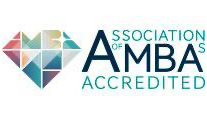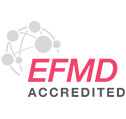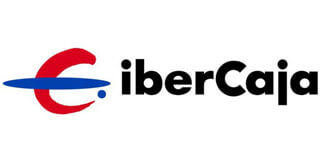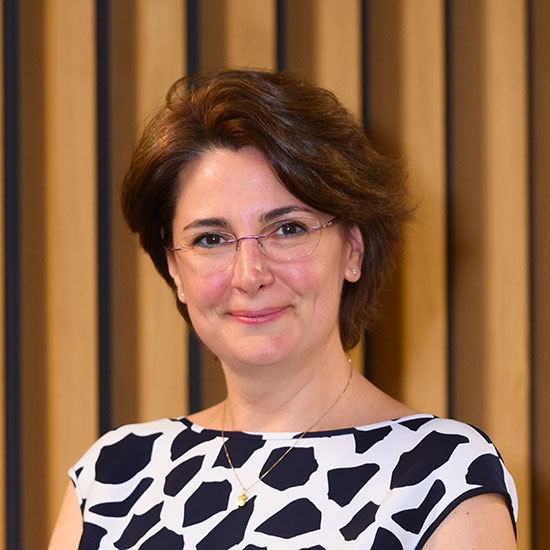Máster Universitario en Management
El Máster Universitario en Management es la aceleradora formativa que te permitirá posicionarte en un entorno empresarial o de emprendimiento.
Nuestro máster de ESIC University está diseñado para que puedas aportar valor a la empresa, adquiriendo un conjunto de competencias (conocimiento y habilidades y actitudes) para desarrollar tu vida profesional en un contexto caracterizado por la complejidad, la globalización y la digitalización.
El currículum de nuestro programa está basado en un diseño transversal de manera que obtendrás una formación holística de la empresa, combinando la visión estratégica enfocada en el mercado y el consumidor con la generación de valor a corto plazo.
Finalizado el programa con aprovechamiento, obtendrás el título de Máster Universitario en Gestión de Empresas expedido por ESIC Universidad. Este Máster Universitario es un título de carácter oficial y habilita para realizar programas de doctorado.
CONVOCATORIA 2026
Hasta 30% de ayuda al estudio. ¡Inscríbete hoy!
Por qué estudiar en ESIC
Conservarás el espíritu start-up de ESIC al abordar disciplinas dinámicas con el máximo rigor, gracias a metodologías activas centradas en ti y conectadas estrechamente con el mundo empresarial.
Acreditado por AMBA - solo 2% de las escuelas del mundo tienen su MBA acreditado.
Curricular International Stay incluido en el precio con destino de una Universidad acreditada por AMBA
Actualizado continuamente por los mejores docentes con experiencia profesional y asesores de nuestra red de empresas colaboradoras.
Diseñado para seguir el flujo natural de la integración en una empresa.
Experiencial y Transversal en cuanto al conocimiento y práctica funcional.
Diseñado para resaltar las fortalezas de los más jóvenes.
Rankings
#1
ESPAÑA
Líderes en másteres de Marketing según El mundo
#3
ESPAÑA
ESIC en el pódium de mejores escuelas de negocio, para recién graduados y jóvenes profesionales
#34
EUROPA
ESIC dentro del Top Europeo para cursar programas de marketing

#49
MUNDIAL
Mejor escuela de Marketing basado en la opinión de alumni, alumnado y empleados

ACREDITACIONES ESIC
Más de 55 años de historia hacen que tengamos acuerdos institucionales y colaboraciones que reconocen nuestra calidad como escuela de negocios. Estas son nuestras acreditaciones:

ASSOCIATION OF MBAS
The international impartial authority
on postgraduate business education

EFMD Programme Accreditation
The leading international system of quality assessment,
improvement and accreditation of business programmes

Agencia Nacional de Evaluación de la Calidad y Acreditación
Sistemas de Garantía de Calidad de Centros y Docencia

ASSOCIATION OF MBAS
The international impartial authority
on postgraduate business education

EFMD Programme Accreditation
The leading international system of quality assessment,
improvement and accreditation of business programmes

Agencia Nacional de Evaluación de la Calidad y Acreditación
Sistemas de Garantía de Calidad de Centros y Docencia
¿Por qué estudiar un Máster Universitario en Gestión de Empresas?
Este máster es perfecto para aquellos perfiles que quieren crecer en un área empresarial pero no tienen los años de experiencia suficientes para un MBA. Al finalizar el Máster Universitario en Gestión de Empresas, podrás iniciar o desarrollar tu vida profesional aportando valor a la empresa gracias a las competencias adquiridas.
DEMANDA
A través de este programa adquirirás los conocimientos necesarios para asumir puestos de trabajo con alta demanda. Además, también es una excelente opción para emprendedores, ya que este máster puede ayudar a desarrollar ciertas habilidades necesarias como la visión de negocio, la creatividad o la capacidad de asumir riesgos.
LIDERAZGO
Este máster te dará las claves para reconocer el entorno de la empresas y gestionar los recursos de los que dispone, así como conseguir resultados positivos de tu equipo. Es muy importante que un equipo esté coordinado por un líder capaz de motivar y potenciar las habilidades de cada miembro.
CRECIMIENTO PROFESIONAL
A través de este programa, podrás generar valor a la empresa y tomar decisiones éticas en un contexto caracterizado por la complejidad, la globalización, la sostenibilidad y la digitalización. Además, la oficialidad del Máster te permite una fácil homologación en cualquier lugar del mundo y te abre la puerta al doctorado, si es una de tus motivaciones.
PERFIL DE ENTRADA ¿A QUIÉN VA DIRIGIDO EL MÁSTER?
Este programa está dirigido a cualquier profesional joven o recién graduado que quiera iniciar o crecer en su carrera, abordando los retos derivados del management, el liderazgo de equipos, la generación de valor y la tecnología.
Este programa también es para ti si eres un recién graduado o un emprendedor que quiera integrarse eficazmente en las diferentes realidades empresariales.
Objetivos del Máster Universitario en Management
Aprenderás a diagnosticar e identificar problemas y desafíos de manera diferencial.
Serás capaz de definir estrategias y planes de acción en línea con la visión y el negocio de la empresa.
Resolverás situaciones complejas de forma creativa en cualquier negocio en entornos altamente internacionalizados y disruptivos.
Desarrollarás un pensamiento positivo y crítico.
Tomarás decisiones y actuarás de forma ética aplicando altos estándares de respeto, diversidad y la sostenibilidad.
PROGRAMA ACADÉMICO DEL MÁSTER
El programa académico se compone de cuatro módulos de aprendizaje y un proyecto final grupal. Todo ello con una enfoque muy práctico y cercano a la realidad empresarial.
METODOLOGÍA TRASFORMATIVE LEARNING:
Un modelo centrado en ti que potencia tu desarrollo personal y profesional a través de:
- Aplicación práctica de la realidad empresarial.
- Desarrollo de soft skills.
- Profesorado experto.
- Comunidad diversa e internacional.
- Acceso a todos los recursos ESIC.
- Incluye materiales online, autoevaluaciones, tutorías personalizadas, actividades experienciales y un proyecto final tutelado, todo orientado a poner en práctica lo aprendido de forma progresiva.
Este módulo te ayudará a desarrollar las habilidades y técnicas necesarias para liderar equipos, comunicar, gestionar conflictos y proporcionar feedback de manera eficaz y ética.
Las asignaturas incluidas en este módulo son las siguientes:
- Marca personal y gestión de la carrera profesional
- Liderazgo, pensamiento crítico y comunicación
Este módulo te ayudará a comprender los diferentes tipos de entorno en los que operan las organizaciones empresariales y cómo este puede influir en la consecución de sus objetivos.
Las asignaturas incluidas en este módulo son las siguientes:
- Modelos económicos
En este módulo aprenderás a desarrollar e implementar estrategias financieras efectivas para alcanzar los objetivos de una organización. La temática se centra en la estrategia empresaria desde sus múltiples dimensiones dentro del marco definido por los Objetivos de Desarrollo Sostenible.
Las asignaturas incluidas en este módulo son las siguientes:
- Estrategia y cultura organizativa
- Innovación y emprendimiento
- Sostenibilidad y ética empresarial
El módulo te enseña a implementar las decisiones estratégicas a través de la toma de decisiones operativas con una visión tanto vertical a nivel de las áreas funcionales de la empresa, como transversal para lograr una adecuada coordinación de estas para el logro de los objetivos estratégicos.
Las asignaturas incluidas en este módulo son las siguientes:
- Finanzas para la toma de decisiones
- Dirección de marketing
- Gestión de proyectos
- Transformación digital y analítica de datos
El proyecto consiste en desarrollar de manera individual un plan de negocio transversal a todas las competencias desarrolladas. Este será defendido en un tribunal que valorará tanto el contenido como la forma.
*Estructura académica sujeta a cambios. Algunas sesiones de realidad empresarial y networking podrían impartirse en webinars fuera del horario lectivo.
Titulación de Máster Universitario por ESIC University
Finalizado el programa con aprovechamiento, obtendrás el título de Máster Universitario en Gestión de Empresas expedido por ESIC Universidad. Este Máster Universitario es un título de carácter oficial y habilita para realizar programas de doctorado.
*ESIC University es una universidad reconocida oficialmente por el Ministerio de Educación español y que otorga tanto títulos universitarios oficiales (grado, máster y doctorado), como títulos de propios (máster de formación permanente). Ambos tipos de títulos cuentan con el mismo respaldo del rigor y el prestigio de ESIC University.
El programa incluye Curricular International Stay orientado a Relaciones Internacionales impartido en una Universidad Europea de primer nivel en entorno AMBA.
Experiencias durante tu master
El programa cuenta con talleres de nivelación, que son contenidos formativos previos a la impartición de las asignaturas específicas, con el objetivo de nivelar los conocimientos y habilidades de los alumnos:
- Introducción a las finanzas y contabilidad (3 ECTS)
- Introducción a la dirección y gestión de empresas (3 ECTS)
SPSS para estadística. Además, Se utilizan simuladores empresariales que replica un entorno de competencia empresaria de cara a que los candidatos puedan tomar decisiones estratégicas y comprobar sus resultados y herramientas de utilidad para el diseño estratégico.
Claustro y ponentes invitados
*Claustro y ponentes invitados sujeto a cambios
Desarrollo profesional y networking
Impulsa tu carrera con el apoyo de la Unidad de Desarrollo Profesional de ESIC (UDP)
La UDP te acompaña en cada etapa de tu trayectoria, tanto como estudiante como al convertirte en Alumni. El área de Empleabilidad gestiona casi 4.000 ofertas de prácticas y más de 2.000 ofertas de empleo anuales, con un ratio de empleabilidad global del 95%. Cuenta con un portal propio, portales internacionales, y realiza actividades de reclutamiento, ferias y formación en empleabilidad.
👉 Recuerda: tu éxito profesional también dependerá de tu iniciativa para identificar oportunidades y tu implicación en el proceso.
Para más información visita los servicios de Empleabilidad, Emprendimiento y Alumni.
95%
de nuestro alumnado está empleado durante el primer año desde la finalización de su programa
+2.000
Alumnado asesorado al año por nuestra Unidad de Desarrollo Profesional
+3.200
Empresas colaboradoras en incorporación de talento anuales
+4.000
oportunidades de prácticas son gestionadas anualmente por la Unidad en nuestros Campus
+1.800
oportunidades laborales disponibles en nuestro portal de empleabilidad anualmente
SALIDAS PROFESIONALES
El programa te prepara para liderar en distintos ámbitos de la empresa, aportando una visión estratégica y global que abre la puerta a múltiples oportunidades profesionales. Entre ellas destacan posiciones como:
- Consultor estratégico
- Responsable de Ventas
- Responsable de Recursos Humanos
- Director/a de Marketing
- Director/a de Finanzas
- Emprendedor/a
- Product Manager
- Marketing Strategist
¿DÓNDE TRABAJAN NUESTROS ALUMNOS?





Estancia Internacional No Curricular
📅 Duración: 1 semana (programa intensivo).
Puedes realizar una experiencia internacional opcional que complemente tu formación con una inmersión en el mundo de los negocios internacionales. Explora nuevas culturas mientras adquieres conocimientos prácticos y construyes una red global. Transforma tu aprendizaje y abre puertas a oportunidades únicas a nivel personal y profesional.
Únete al curso intensivo de 5 días "Understanding Today’s Business Environment" en Georgetown University. Sumérgete en clases impartidas en inglés por profesores de prestigio y expertos del sector para explorar los factores económicos, tecnológicos, sociales y políticos que definen el entorno empresarial actual. Descubre el impacto de la inteligencia artificial, las instituciones financieras internacionales y las nuevas tendencias en liderazgo global. Complementa tu experiencia académica con visitas culturales a lugares emblemáticos de Estados Unidos. Una oportunidad única para transformar tu visión estratégica desde el corazón de América.
¿Qué incluye?
- Clases presenciales con profesores y expertos del sector
- Estudios de caso sobre economía global, IA y política financiera
- Visitas a instituciones financieras internacionales
- Experiencia cultural en hitos clave de la cultura americana
- Certificado de Georgetown University al finalizar
¿Qué NO incluye?
- Alojamiento
- Vuelos
- Comidas
¿Tienes dudas? ¡Contáctanos!: oficina.internacional@esic.edu
Sumérgete en el curso intensivo de 5 días "ESG in the New Business Era" en EM Normandie y descubre cómo las empresas integran los criterios ambientales, sociales y de gobernanza en su estrategia global. Aprende en inglés con profesores expertos y profesionales de la sostenibilidad a través de clases, casos prácticos y visitas a empresas líderes. Desarrolla tu capacidad para comunicar compromisos ESG, liderar políticas de impacto y avanzar hacia una economía circular y responsable.
¿Qué incluye?
- Clases presenciales con expertos en ESG y sostenibilidad
- Estudios de caso sobre gobernanza y sostenibilidad
- Estrategias de comunicación interna y externa en ESG
- Visitas a empresas líderes en el sector
- Certificado de finalización de EM Normandie
¿Qué NO incluye?
- Alojamiento
- Vuelos
- Comidas
¿Tienes dudas? ¡Contáctanos!: oficina.internacional@esic.edu
¡Descubre el programa intensivo de 5 días "Digital Innovation and Transformation: Estonia’s Path to the Future" en el país más digitalizado de Europa! Aprende en inglés con expertos en innovación digital a través de sesiones prácticas, visitas a startups y formación en metodologías ágiles y diseño centrado en el usuario. Evalúa la viabilidad de nuevas soluciones tecnológicas mientras te sumerges en el ecosistema emprendedor de Estonia. Una oportunidad única para transformar tu enfoque empresarial con una visión innovadora y global.
¿Qué incluye?
- Clases presenciales con expertos en innovación digital
- Visitas a Start Ups y sesiones académicas
- Formación en metodologías ágiles y diseño centrado en el usuario
- Evaluación del potencial y viabilidad de innovaciones digitales
- Certificado de finalización
¿Qué NO incluye?
- Alojamiento
- Vuelos
- Comidas
¿Tienes dudas? ¡Contáctanos!: oficina.internacional@esic.edu
Extension programme
📅 Duración: de 3 a 12 meses (mínimo 12 créditos).
Amplía tus horizontes académicos y profesionales con el Extension Programme, una oportunidad única de especialización internacional. Diseñado para complementar tu formación, este programa te permite elegir asignaturas y cursos de un portfolio exclusivo de más de 60 universidades en Europa, Asia y América.
Podrás personalizar tu aprendizaje con materias alineadas a tu carrera y adquirir conocimientos clave para tu futuro profesional. Al finalizar, recibirás un certificado oficial con asignaturas y créditos acreditados, validando tu experiencia global, y sin coste académico, ya que ESIC lo cubre a través de sus acuerdos bilaterales. ¡Lleva tu formación al siguiente nivel y destaca en un mundo sin fronteras!
¿Qué incluye?
- Clases presenciales universitarias
- Evaluación y seguimiento
- Certificado de finalización, acta de notas y créditos acreditativos
¿Qué NO incluye?
- Vuelos
- Alojamiento
- Manutención
¿Tienes dudas? ¡Contáctanos!: oficina.internacional@esic.edu
Si quieres ver todas las universidades con la información detallada aquí tienes.
DESCARGAR EXTENSION PROGRAMMECampus, precios y formatos
El Máster in Management de Madrid se imparte en el campus de ESIC Business & Marketing School. Nuestro campus en Madrid se inauguró en 2021 y cuenta con 36 aulas, un auditorio para 300 personas, 16 salas de trabajo, 5 meeting points, gimnasio, sala de mindfullness, cafetería y mucho más. Nuestras aulas están llenas de alumnos de másteres y postgrados especializados en marketing, management y tecnología. El campus es el lugar idóneo para hacer networking, trabajar en tus ideas y aprender. Pero, sobre todo, es el lugar perfecto para vivir el presente y construir el futuro.
Campus en Madrid
Camino de Valdenigriales, s/n. 28223
Pozuelo de Alarcón, Madrid
Teléfono +34 91 452 41 00
Ver en Google MapsConvocatorias y precios
Precio:
25.800 €
PROCESO DE ADMISIÓN
Te acompañamos durante todo el proceso del camino, guiándote y asesorándote para que elijas la mejor opción para tu carrera profesional. Estos son los pasos a seguir:
1 Solicitud
- Solicitas información a través de nuestro formulario.
- Un asesor se pone en contacto contigo en las siguientes 24-48h.
- Tenéis una primera llamada como toma de contacto y se convoca una asesoría para preguntas y dudas.
- Se tiene una segunda llamada donde se resuelven todas tus dudas y se te orienta en todo lo que necesites.
2 Prueba
- Si el programa te encaja, procedes a postular tu candidatura.
- Preparas la documentación necesaria (como el título universitario o certificados).
- Realizas un ensayo personal y profesional.
- Entregas toda la documentación.
3 Entrevista
- Una vez que se aprueba la documentación, te citan para una entrevista con el director o directora del programa.
- En esa entrevista, podréis conversar sobre especificaciones que quieras saber sobre el programa, así como dudas.
4 Matriculación
- Tras la entrevista, en 24-48h tu asesor contactará contigo para notificarte si has sido aceptado en el programa.
- Dispones de unos 5 días para formalizar la matrícula.
- Una vez completada, recibirás tus accesos (aula virtual, correo, etc.).
- Finalmente, te damos la enhorabuena y te animamos a aprovechar al máximo tu formación.
BECAS Y AYUDAS
Actualmente contamos con una serie de becas y convenios de financiación para que podamos ayudarte con tu futuro.
- Becas propias
- Becas nacionales
- Becas internacionales
- Becas de movilidad para prácticas internacionales
- Seguro y ayudas
ESIC mantiene convenios de financiación con determinadas entidades bancarias en condiciones preferentes para los alumnos matriculados en cualquiera de los programas de la escuela. En la Secretaría del Área se encuentran las normas y condiciones específicas de cada uno de estos convenios. ESIC te ayuda con la financiación de tu Carrera.
Si vives fuera de alguna de las ciudades donde ESIC tiene campus, y buscas alojamiento, te recomendamos una serie de compañías y residencias dedicadas al alojamiento de estudiantes. Busca la que mejor se adapte a tus necesidades.
SABER MÁS SOBRE FINANCIACIÓN
ESIC se ha asociado con la plataforma Flywire para aceptar pagos de estudiantes extranjeros de todo el mundo. Puedes realizar tu pago de forma fácil y segura en tu propia divisa, mediante formas de pago locales desde la seguridad y comodidad de tu hogar. Tendrás seguimiento en tiempo real y soporte multilingüe a cualquier hora.
SABER MÁS SOBRE FLYWAREOTRAS TITULACIONES QUE PUEDEN INTERESARTE
PREGUNTAS FRECUENTES
Las ayudas al estudio se te comunicarán durante el proceso de selección. Nuestras ayudas se adaptan a cada perfil y fecha en la que se realiza la matriculación. Además, puedes informarte de las Becas que tenemos tanto desde ESIC como las que ofrecen otros organismos públicos y privados.
Si, hay un porcentaje de asistencia obligatoria en los Másteres presenciales. No obstante, puedes tener un pequeño porcentaje de faltas injustificadas.
Según lo regulado en el Real Decreto 822/2021, de 28 de septiembre, por el que se establece la organización de las enseñanzas universitarias y del procedimiento de aseguramiento de su calidad, desde ESIC ponemos a tu disposición diversos programas entre MBAs, Másteres Universitarios y Másteres de Formación Permanente respaldados por el prestigio de nuestra universidad: ESIC University.
De esta manera, podrás elegir entre:
- Másteres Universitarios, con los que obtendrás una titulación oficial de ESIC University
- Másteres de Formación Permanente, con los que podrás obtener un título expedido por ESIC University y otro expedido por ESIC Business & Marketing School
- Másteres de titulación privada expedidos por ESIC Business & Marketing School































